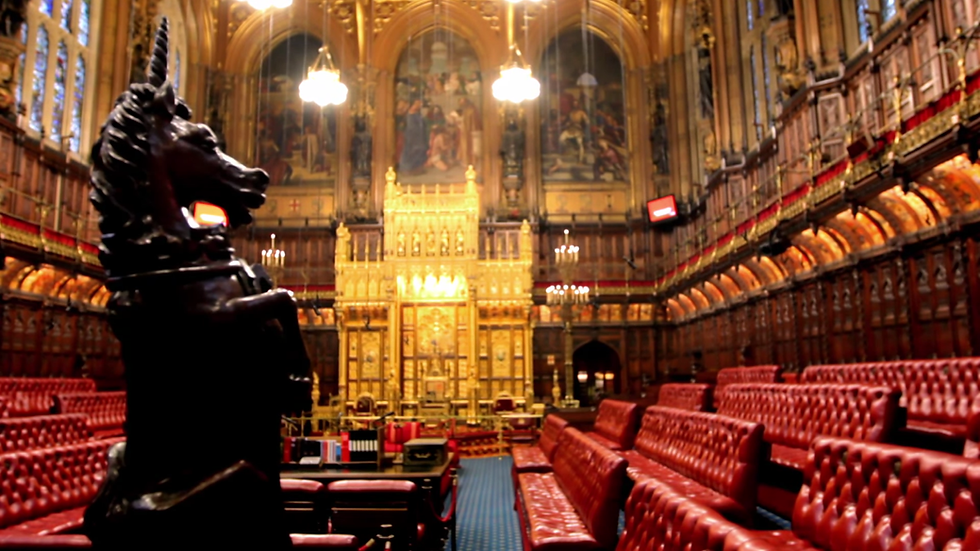The House of Lords is essential, but endangered
- Liam Roberts

- Aug 4, 2025
- 4 min read
Labour’s vague proposals for House of Lords reform threaten its vital role in legislative scrutiny. It's impossible to change the composition of the House of Lords without sacrificing its virtues. Those virtues are because the House is unelected.
By Liam Roberts, taken from the thoughts and ideas of Phillip, Lord Norton of Louth

4 AUGUST 2025
It would appear that nothing is safe in politics in 2025 – the House of Lords may be in trouble next. The second chamber is arguably under greater jeopardy than ever before in Britain’s constitutional history. Labour have taken an axe to many policy objectives of the last 15 years, and now even constitutional pragmatism seems at risk.
Labour’s manifesto promises reform of the second chamber, echoing the constitutional upheavals of the past 15 years. Yet, these proposals lack clarity on timing, scope, or intent, reminiscent of the vague ambitions seen in coalition-era plans. The danger is real: ill-considered reforms could destabilise a vital institution that has underpinned Britain’s governance for centuries.
There’s a paradox to House of Lords reform. Often, advocates of reforming the upper chamber don’t define what it means and what it entails. They also can-not fathom the consequences of their actions.
"Proposing to modify composition while preserving function is akin to going vegetarian but continuing to eat meat – a contradictory stance."
Critics target the chamber’s composition - hereditary peers or the 26 bishops - as undemocratic or outdated. Yet, hereditary peers, internally elected, are the only members with any electoral mandate, and the bishops’ presence reflects centuries-old tradition.
It’s also impossible to change the composition of the House of Lords without also altering its function. Changing who sits in the chamber alters how it operates, despite claims otherwise.
Proposing to modify composition while preserving function is akin to going vegetarian but continuing to eat meat – a contradictory stance. Past reforms, like those under Blair, prove this point.
Consider the 1999 House of Lords Act under Tony Blair, which removed all but 92 hereditary peers. This move, often hailed as democratic, had unintended consequences. It eliminated peers with an elected basis, replacing them with appointed Labour peers, shifting the chamber’s balance.
"The House of Lords serves a unique and underappreciated purpose. While the Commons drives big ideas and government agendas, the Lords focuses on refining legislation to ensure it works."
Indeed, Sir Tony Blair appointed 374 Labour life peers to the House of Lords during his tenure as Prime Minister from 1997 to 2007, the highest number of life peerages created by any prime minister under the Life Peerages Act 1958.
The cash for honours scandal (2006-2007) cast a shadow over many of Blair’s appointments, with allegations that wealthy donors were rewarded with peerages. Appointments such as Lord Levy, Blair’s personal fundraiser and tennis partner, were particularly controversial.
By 2005, the Constitutional Reform Act further reshaped the Lords by removing the Law Lords, Britain’s equivalent of high justices. This change, presented as modernizing, merely relocated them to a Supreme Court across from Westminster, with powers akin to U.S. Supreme Court justices but less accountability than under the Lord Chancellor, who answered to both Parliament and government.
"You can change the composition of the House of Lords, but you cannot keep its virtues."
The House of Lords serves a unique and underappreciated purpose. While the Commons drives big ideas and government agendas, the Lords focuses on refining legislation to ensure it works. Since the 1911 Parliament Act, the Lords cannot veto bills but can amend them, drawing on peers’ expertise to improve laws regardless of party lines.
This process is meticulous, with peers sitting in committees, examining bills line-by-line, sometimes over hundreds of pages, and debating without time constraints. This scrutiny is vital. Over 80% of Lords’ amendments are accepted by the Commons, addressing loopholes and issues the Commons, pressed for time, overlooks.
Time is a scarce resource for governments, second only to public funds. The Lords’ ability to dedicate extensive review to legislation ensures better outcomes, a role that goes unnoticed by those who see it merely as a delay to government business.
Imagine the Lords as an elected chamber. The calm, expertise-driven debates would vanish, replaced by the partisan clamour of the Commons. Elected peers, subject to party whipping and electoral pressures, would prioritise political point-scoring over careful consideration.
Term limits or party-driven appointments would further erode the chamber’s independence, undermining its ability to refine legislation effectively. The current system, while imperfect, avoids these pitfalls. Peers, appointed or hereditary, speak based on expertise, not just party loyalty.
You can change the composition of the House of Lords, but you cannot keep its virtues.
Those virtues are exclusive to current model; a combination of appointed expertise, hereditary members, and bishops that serves the country well.
Their debates, often unwatched, focus on content, not headlines. Reforms that introduce elections or term limits would sacrifice this strength, as seen in other bicameral systems across the Channel or Atlantic, where elected upper chambers often replicate the dysfunction of their lower counterparts.
Britain’s bicameral Parliament, rooted in the 13th century, has endured revolutions, the Blitz, and the Winter of Discontent. No government should feel it has the intellectual authority to change such a long-standing institution. Its resilience stems from its adaptability within a framework of tradition. The House of Lords, with its unique role in legislative scrutiny, must remain unelected to preserve its function.
In summary, proposed reforms to the House of Lords risk compromising its essential role. The chamber’s strength lies in its ability to provide careful, expertise-driven scrutiny, free from the electoral pressures that define the Commons. Labour’s vague plans threaten to repeat the mistakes of past reforms, creating constitutional loopholes and undermining a system that has served Britain for centuries. The House of Lords is not perfect, but it is non-negotiable.

Liam Roberts is a British Politics and Legislative Studies student at the University of Hull and Deputy Chairman of East Leeds Conservatives. He is a student of Lord Norton, who is a writer, academic, and Conservative member of the House of Lords. You can follow him on X/Twitter here




Comments